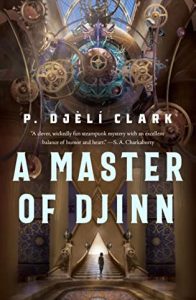 “The Year Without Sunshine” by Naomi Kritzer in Uncanny Magazine Issue 55, November-December 2023 by Naomi Kritzer
“The Year Without Sunshine” by Naomi Kritzer in Uncanny Magazine Issue 55, November-December 2023 by Naomi Kritzer Format: ebook
Source: supplied by publisher via Hugo Packet
Formats available: magazine, ebook
Genres: climate fiction, hopepunk, science fiction
Series: Uncanny Magazine Issue 55
Pages: 35
Published by Uncanny Magazine on November 7, 2023
Purchasing Info: Author's Website, Publisher's Website, Amazon
Goodreads
The November/December 2023 issue of Hugo Award-winning Uncanny Magazine.
Featuring new fiction by Naomi Kritzer, Jeffrey Ford, Kel Coleman, Cecil Castellucci, Marissa Lingen, Chelsea Sutton, and Ana Hurtado. Essays by John Scalzi, Amanda-Rae Prescott, Paul Cornell, and Lee Mandelo, poetry by Carlie St. George, Tehnuka, Lora Gray, and Angela Liu, interviews with Jeffrey Ford and Marissa lIngen by Caroline M. Yoachim, a cover by Paul Lewin, and an editorial by Lynne M. Thomas and Michael Damian Thomas.
Uncanny Magazine is a bimonthly science fiction and fantasy magazine first published in November 2014. Edited by 2016, 2017, 2018, 2019, 2020, 2022, 2023 Hugo award winners for best semiprozine, and 2018 Hugo award winners for Best Editor, Short Form, Lynne M. Thomas and Michael Damian Thomas, and Monte Lin, each issue of Uncanny includes new stories, poetry, articles, and interviews.
My Review:
I’m just realizing that I need a spreadsheet for my project to read and review this year’s Hugo nominees – if possible before the voting deadline on July 20. Today’s entry in the continuing saga is Naomi Kritzer’s “The Year Without Sunshine”, my third nominee in the Best Novelette Category.
A novelette is between 7,500 and 17,500 words, and this particular novelette did an excellent job of making every single one of those words count.
The story takes its climate change/post-pandemic scenario and doesn’t get into the SF aspects because it doesn’t need to. Instead, it takes that pretty grim setup and tells a bright, sparkling, hopepunk story about a community that bands together so they ALL get through a year when there literally is no sunshine because the sky is choked with ash.
In this story, we don’t exactly get details of what caused the problem, but we don’t need them. Those details are not the point.
The point is the people. This one tiny community pulls together – and does it effectively – because one community member is suffering from COPD and will only live as long as her oxygen concentrator has power. But power failures are a daily occurrence, their generator runs on propane, and propane deliveries – along with a lot of other services that people have come to expect – have stopped.
So it begins with ideas to keep Susan alive. But that need is a catalyst for everything that happens until there’s blue sky again – and that story of hope and perseverance and taking care of your neighbors – and being taken care of in return – is simply lovely.
Escape Rating A: This is a story about the way that we wish things were, when a group of people relies on the better angels of their nature instead of the demons of self-interest.
What made this story work so well for this reader – is just how grounded it is in the real as well as the really hopeful. While this particular disaster scenario hasn’t happened, there are plenty of precedents for both the “year without sunshine” and for communities pulling together in times of crisis.
So it all feels, not just plausible but true in that way that fiction is the lie that tells the truth, because the story doesn’t gloss over the fact that some would-be communities take more selfish paths and that there are occasions when the community as a whole will have to defend what they’ve built. But it just adds to the hopeful tone of the story and I finished it with a smile on my face both for what it said AND how well it said it.
If you are curious about other takes on this year’s Hugo nominees, I am far from the only person doing this. There’s an opinionated and informative thread on reddit that has sometimes been even more fascinating than the actual stories. Although not in this particular case as it seems like their readers as well as this one were generally fascinated with this particular story and had little if anything negative to say. “The Year Without Sunshine” is a delight, and my voting in this category just got a LOT harder.

 "The Mausoleum's Children" by Aliette de Bodard in Uncanny Magazine Issue 52, May-June 2023 by
"The Mausoleum's Children" by Aliette de Bodard in Uncanny Magazine Issue 52, May-June 2023 by  I put this particular story towards the front of the list because of the author. I’ve very much enjoyed her
I put this particular story towards the front of the list because of the author. I’ve very much enjoyed her  The obvious bit is wrapped around Thuận Lộc’s need to belong, her guilt about not bringing her peeps out with her, and her attempt to assuage just a piece of that trauma. But there’s also more than a bit about abuse and its victims, Stockholm Syndrome writ very, very large, and the rapaciousness of greed for power in all forms and the way that some people try to escape evil by getting on top of it or allowing themselves to be co-opted by it.
The obvious bit is wrapped around Thuận Lộc’s need to belong, her guilt about not bringing her peeps out with her, and her attempt to assuage just a piece of that trauma. But there’s also more than a bit about abuse and its victims, Stockholm Syndrome writ very, very large, and the rapaciousness of greed for power in all forms and the way that some people try to escape evil by getting on top of it or allowing themselves to be co-opted by it. "One Man's Treasure" by Sarah Pinsker in Uncanny Magazine Issue 50, January-February 2023 by
"One Man's Treasure" by Sarah Pinsker in Uncanny Magazine Issue 50, January-February 2023 by  "How to Raise a Kraken in Your Bathtub" by P. Djèlí Clark in Uncanny Magazine Issue 50, January-February 2023 by
"How to Raise a Kraken in Your Bathtub" by P. Djèlí Clark in Uncanny Magazine Issue 50, January-February 2023 by  As a person with at least a Supporting Membership in this year’s World Science Fiction Convention, I have voting rights for the Hugo Awards. In order to be informed about exercising those rights, the Awards committee compiles a packet of ebook versions of as much of the nominated material as the publishers will give them. That packet became available this week and I immediately downloaded the lot.
As a person with at least a Supporting Membership in this year’s World Science Fiction Convention, I have voting rights for the Hugo Awards. In order to be informed about exercising those rights, the Awards committee compiles a packet of ebook versions of as much of the nominated material as the publishers will give them. That packet became available this week and I immediately downloaded the lot.